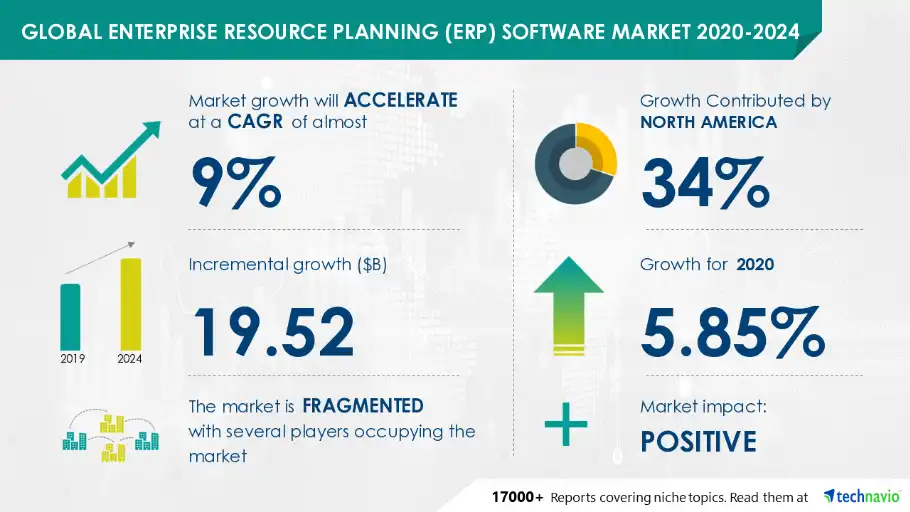Businesses that select cloud-based ERP solutions for their needs are keenly aware of the ways enterprise resource software (ERP) helps them thrive. It supports many business-critical functions, like resource management and faster operations.
Cloud-based ERPs are also an excellent way to future-proof your business. Their centralized nature is an easy way to simplify collaboration and enhance communication among teams as more employees join from distant locations.
In this article, we’ll take a closer look at cloud-based ERPs and how they can help your business.
What is a Cloud-Based ERP?
In cloud ERP solutions, all company data, files, and programs, are hosted and maintained by a remote 3rd party. Everything is accessed through the internet or “ERP cloud” so teams can share information and communicate in real-time.
A remote 3rd party hosts and maintains all company data, files, and programs. Companies access everything through the internet or the “ERP cloud.” Cloud ERP solutions allow teams to share information and communicate in real-time.
Need Help Finding the Right ERP?
5 Benefits of Cloud-Based ERPs
Increase Flexibility
Cloud-based ERP solutions mimic the elastic nature of a business. Cloud-based ERP solutions can adapt to the changing nature of companies.
They are customizable to handle:
- Increasing numbers of users
- Shifting sales volumes
- Other complex requirements as markets and consumer needs evolve
Enhance Accessibility
Many cloud solutions let employees access key data in real-time. Cloud-based ERP systems may also be accessed from mobile devices if set up to do so.
Lower Cost
When businesses opt for a cloud ERP vendor, they pay a recurring subscription fee instead of an upfront investment. In contrast, on-premise ERP systems need on-site hosting and maintenance, involving expenses for equipment and electricity.
- Cloud ERP vs. On-Premise ERP
- 5 Secrets of Successful ERP Implementation
- Why Use Cloud-Based ERP Systems for Manufacturing?
Quick Deployment
Cloud-based ERP leverages existing cloud architecture, allowing organizations to deploy a new system over a shorter period. This is because you don’t need to worry about hardware setup when you deploy a cloud-based system.
Easy Maintenance
Some cloud ERP providers are responsible for security updates, feature upgrades, and enhancements. Businesses do not have the added burden of updating any software themselves.
How to Find the Best Cloud-Based ERP for Your Organization
Determine Current Needs
To find the best ERP solution, determine what functions you need.
Your initial considerations may include the following:
- Business processes you plan on continuing
- Business processes you plan on improving
- Any legacy systems you will continue to use
- Which departments will use the ERP system
- Which departments will share the data
Some cloud-based ERP systems specially cater to specific industries and verticals. For example, Oracle Procurement Cloud and Financials Cloud have built-in workflows and reporting capabilities specifically for healthcare, helping facilities improve patient experiences.
Plan for Future Needs
The ideal ERP will fit your current needs while being flexible enough to accommodate future needs. For instance, if you plan to expand into new markets, ensure the ERP allows you to scale and adapt as your business grows.
Most cloud ERPs offer standard modules, reporting, and workflows. Yet, all businesses are different.
Consider any customizations you may need for existing functionality. Will customizations integrate easily with your other solutions, equipment, software, and established processes? For more information on specifics like customizations, consult with qualified ERP consultants.
Research Vendors
In order to determine cloud ERP vendors that meet your requirements, research their success rate with other companies like yours. This activity can indicate your likelihood of satisfaction and success in partnering with a vendor.
Success indicators may include:
- Number of years in business
- Number of customers served
- Positive customer testimonials
- Valid accreditations or specialized training in ERPs specific to your industry
- Success stories from businesses like yours
Request referrals from current or previous customers of a vendor. Inquire about their experience working with the vendor and using the software.
Platforms for Cloud ERP research include:
- Industry reports by research firms (i.e., Gartner)
- Online ERP support communities (i.e., Oracle ERP Communities)
- Online forums (i.e., Reddit, Quora)
- Peer review websites

Source: Business Wire
Book Product Demos
Product demos can help you make an informed decision. You can test the software’s features and functionality, test-drive user-friendliness, and ask questions.
A product demo is an opportunity to enquire about:
- How will the vendor protect your data?
- What product support does the vendor provide?
- Does the vendor provide training?
- What is on the planned product roadmap?
- What are the subscription costs?
- What are the extra fees beyond the subscription?
Ease of use is an important consideration as the ERP impacts your employees.
Choosing a tool that is too difficult to use can result in negative consequences – i.e., poor user experiences and system failures.
Consider ROI
Cost is an important consideration when selecting cloud-based ERP software. It would help if you considered whether there will be charges for software implementation, such as labor charges for customization by the vendor or service provider.
Calculate the overall return on investment (ROI) for investing in an ERP solution. For example, consider how automating manual and time-consuming tasks saves time and improves efficiency.
Ensure a Scalable Cloud-Based ERP for Your Growing Needs
Choosing an ERP vendor is a long-term investment. It is more than a business transaction; it’s about making a strategic partnership to help you scale for years to come.
Choosing the right cloud-based ERP is a critical decision that can spur or hinder a business.
Sometimes teams need expert consultation to find and implement the best ERP. That’s where NexInfo comes in to help.
Our team of expert consultants can help you with:
- ERP software deployment
- Organizational design
- Ongoing managed services
- Business operations strategy
Construct a system architecture tailored to your unique needs and get the greatest ROI from your ERP of choice. We are here to help.








